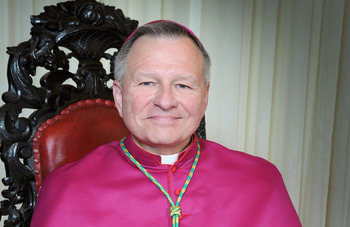
A platform that encourages healthy conversation, spiritual support, growth and fellowship

NOLACatholic Parenting Podcast
A natural progression of our weekly column in the Clarion Herald and blog

The best in Catholic news and inspiration - wherever you are!
As Pope Francis proposes, war is always a defeat
-
 Archbishop Gregory M. Aymond
Archbishop Gregory M. Aymond
Clarion HeraldWar is both a sad reality and a symptom of our fallen human nature. Historians have designated two 20th-century wars as “world” wars, but the bitter truth is that global war remains with us and, as Pope Francis has made clear, represents a cry against humanity that is always and everywhere a defeat.
The Geneva Academy tracks wars across the world, and it has published some chilling statistics. Currently, there are more than 110 armed conflicts globally: more than 45 in the Middle East and North Africa; more than 35 in Africa; 21 in Asia; six in Latin America; and seven in Europe.
When the Holy Father greeted thousands of pilgrims in St. Peter’s Square on Sunday, April 14 – the day after Iran launched a drone attack on Israel in retaliation for an Israeli attack on the Iranian consulate in Damascus, Syria, on April 1 – he made a plaintive cry for an immediate ceasefire. He asked for the warring sides to “stop every action that could stoke the spiral of violence and risk dragging the Middle East into a much bigger war conflict.”
In his most recent document on human dignity (“Dignitas Infinita”), Pope Francis wrote that the “tragedy” of war is that it “denies human dignity.” The Holy Father detailed in his message for the World Day of Peace in 2016 that “war, terrorist attacks, racial or religious persecution, and many other affronts to human dignity … ‘have become so common as to constitute a real ‘third world war’ fought piecemeal.’”
The pope has carefully reaffirmed a nation’s inalienable right to self-defense and the responsibility to protect those whose lives are threatened, but he has emphasized that war remains a “defeat of humanity.”
“No war is worth the tears of a mother who has seen her child mutilated or killed,” the Holy Father said. “No war is worth the loss of the life of even one human being, a sacred being created in the image and likeness of the Creator; no war is worth the poisoning of our common home; and no war is worth the despair of those who are forced to leave their homeland and are deprived, from one moment to the next, of their home and all the family, friendship, social and cultural ties that have been built up, sometimes over generations.”
I prayerfully join the Holy Father in appealing for a ceasefire in the six-month war in Gaza. I also pray that Hamas, which Iran supports, will release the 133 hostages still believed to be held. There is also an urgent need to provide humanitarian aid to the 2.3 million Palestinians living in Gaza who are threatened by starvation.
Pope Francis has called for a two-state solution in the Middle East that would allow Palestinians and Israelis to live next to each other in peace. He appealed for the international community to foster initiatives that might end the war.
“All nations should come down on the side of peace and help the Palestinians and the Israelis to live in two states, side by side, in security,” Pope Francis said. “It is their profound and legitimate desire, and it is their right. Two neighboring states! Let a ceasefire be soon reached in Gaza, and the path of negotiations be pursued, negotiations with determination.”
The U.S. bishops have a decades-long history of advocating for peace among nations, particularly in light of the destructive capability of nuclear weapons to change the face of the earth. In a 1983 “Pastoral Letter on War and Peace,” the bishops said the nuclear age was an era of both moral and physical danger.
We are the first generation since Genesis with the power to virtually destroy one another and God’s creation, the pastoral letter pointed out. “We cannot remain silent in the face of such danger,” it continued. “Fundamentally, we are saying that the decisions about nuclear weapons are among the most pressing moral questions of our age.”
In 1981, St. John Paul II warned us that modern-day warfare imperiled the earth.
“Our future on this planet, exposed as it is to nuclear annihilation, depends upon one single factor: humanity must make a moral about-face,” he said. “The whole world must summon the moral courage and technical means to say ‘no’ to nuclear conflict; ‘no’ to weapons of mass destruction; ‘no’ to an arms race which robs the poor and the vulnerable; and ‘no’ to the moral danger of a nuclear age which places before humankind indefensible choices of constant terror or surrender. Peacemaking is not an optional commitment. It is a requirement of our faith.”
Jesus, Prince of Peace, show us the way!
Questions for Archbishop Aymond may be sent to [email protected].




